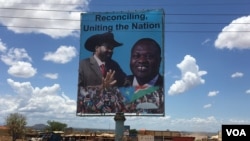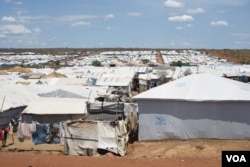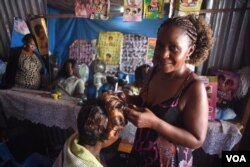In South Sudan, rebel leader Riek Machar is due to return to the capital Monday to assume the vice presidency of a new transitional government. His arrival will be a key step toward implementing the August 2015 peace deal. In Juba, people are hopeful an end to the conflict may be in sight.
No one is more excited for Riek Machar’s arrival than those living in a United Nations camp on the edge of Juba.
30,000 ethnic Nuer citizens live here because they fear government troops controlling the city. The government stands accused of massacring Nuer civilians at the start of the civil war.
The two-and-a-half-year war began as a political feud but has split South Sudan along ethnic lines. Rebel leader Machar is a Nuer, while President Salva Kiir is Dinka.
Sunday William, a secondary student in the U.N. camp, said she will dance when Machar returns. "For me I'm very happy for the return of Dr. Riek Machar, for sure, even us we are suffering a lot here. We wish to go outside."
Yet William and others said they won't go home just yet. Camp leader Thod Mayei said there must be accountability for crimes committed during the war.
The conflict has killed tens of thousands of people, many of them civilians. Both sides are accused of abuses.
"We want justice to take place first. After that, we will know that the people or the criminals that killed people, or the perpetrators, that they are bringing to the book," said Mayei.
Outside the camp in Juba's Konyo Konyo market, hairdresser Mary Sanyu said she too will dance in the streets to celebrate Machar's return.
Sanyu said she hopes peace will improve South Sudan's crumbling economy. During the war, food prices have skyrocketed while the South Sudan pound has fallen against the dollar.
"Even for us who are working here, we need him to come back," said Sanyu. We need him to come because now things are so expensive. "I think he will do something good for the price of the what, everything."
Still, Machar's return could spark more violence. There are both government and rebel troops stationed in Juba, and the two sides have traded accusations of disrupting the peace process. Fighting continues in at least one part of the country.
Elijah Bol, a master's student, said many of his friends have left Juba. "Some people are saying that if Machar comes, there will be war in Juba. They have evacuated Juba. They have gone."
But Bol said he's staying put. The time of war has gone, he said — now it is peace time.






